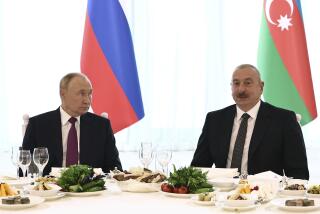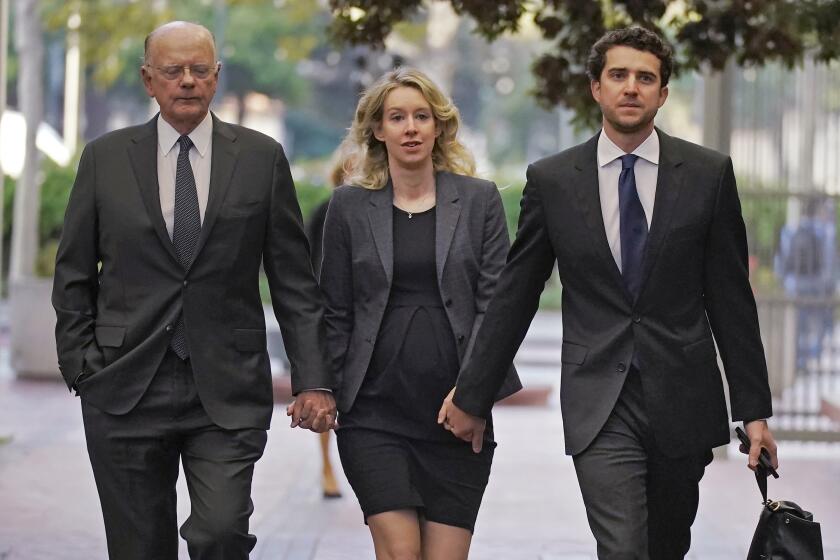In Seattle, Yeltsin Gives Hosts the Business : Russia: The president seeks to enhance commercial ties across the Pacific Rim. Executives greet him enthusiastically but remain wary.
- Share via
SEATTLE — In further acknowledgment of the westward shift of America’s economic potential, Russian President Boris N. Yeltsin on Thursday concluded his U.S. visit in the other Washington.
Here, far from the lawn of the White House and the chambers of the United Nations, the difficult matters of global arms and diplomacy yielded to an equally challenging proposition: Russia’s claim to be a credible business partner along the flourishing Pacific Rim.
Potato chips and microchips, the lowly Arctic codfish and the lofty space station--these are the early and thin economic links already established across the North Pacific between America’s Pacific Northwest and Russia’s Far East. In a seven-hour visit to Seattle, Yeltsin lent his prestige to try to shore up the bridge.
“The West Coast of the United States has established very good contacts with us. . . . It is time to cooperate on a pragmatic basis,” the Russian leader said. “Last year our trade volume doubled. . . . I see considerable change for the better.”
His audience of 800 business and political leaders was enthusiastic with its greeting, but a good deal more cautious in assessing the climate for conducting commerce in Russia.
Boeing Co. Chairman Frank Schrontz met privately with Yeltsin for half an hour but said there was no discussion of Russia’s 50% tariff on aircraft imports. The Weyerhaeuser Co., which for five frustrating years has been seeking a joint venture with the Russians to harvest Far East timber, was to meet with Yeltsin deputies, but spokesman Frank Mendizabal remarked: “Will it help? I don’t know. Russia is a tough place to do business.
“The trouble is, you don’t know who to deal with,” Mendizabal said. “Who owns the forest? The Moscow government? The provincial government? The local people? The ex-party officials?”
After three days in New York and Washington, D.C., Yeltsin seemed in high spirits as he toured Boeing’s airplane manufacturing facilities and a mock-up of NASA’s planned space station, a joint project of the United States and Russia. And he joked and toasted his way expansively through what was supposed to be a luncheon with the business leaders--a meal for which Yeltsin rearranged the program and brought food service to a halt so that he could launch directly into his speech.
“These are gathered entrepreneurs,” Yeltsin explained with a grin. “I should do business, and then I should do food.”
He repeatedly played to the western part of the country’s image of itself as the vibrant heart of the Pacific Rim.
“In the West of the United States, there are more smiles. In the East, more stress,” he said.
Yeltsin seemed to acknowledge investor concerns, particularly about crime and political stability. He joked that business executives could travel to Russia these days “without about 15 bodyguards.”
But there was no joke in his voice when he said, “Let me tell you, we have achieved political stability.”
And his pitch was blunt: “You have to understand, you are investing in a reliable country. You are investing in a great country with a very large market. . . . Trade means new jobs for Americans.”
Yeltsin then toured Seattle’s port aboard a passenger ferry and dropped in for a brief visit with a “typical American family”--at the home of Rolf and Dawn Gruen and their two teen-age children.
Mrs. Gruen is a psychotherapist and Mr. Gruen a jobs counselor, and the couple is host to a 16-year-old Russian exchange student.
Such a visit was similar to a family drop-by that Chinese President Jiang Zemin made during a visit to Seattle last year.
In truth, West Coast trade with Russia remains small--$36 million was exported from the state of Washington to Russia last year, less than went to Egypt.
But a good many entrepreneurs with a tolerance for risk are setting up joint ventures based in Seattle, ranging from container shipping to seafood, and even a much-publicized effort to break into the Russian snack food market by Tim Kennedy of Tim’s Cascade Style Potato Chips.
Times researcher Doug Conner contributed to this report.
More to Read
Inside the business of entertainment
The Wide Shot brings you news, analysis and insights on everything from streaming wars to production — and what it all means for the future.
You may occasionally receive promotional content from the Los Angeles Times.










